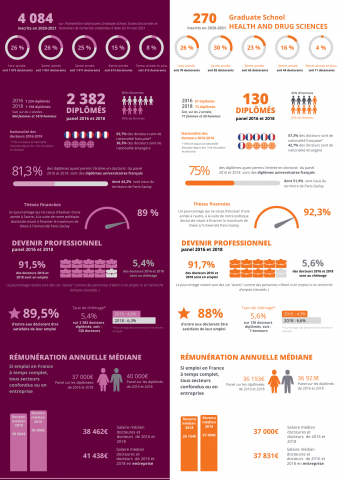
PhD Program in Health and Drug Sciences - Graduate School Health and Drug Sciences (HeaDS)
The doctoral program "Health and drug sciences" is part of the societal challenge "Health and well-being". Its objective is to promote innovation in the field of drugs and health. It offers multidisciplinary training in various fields of health product development. This program is organized in connection with the seven thematic clusters of the ED ITFA, which cover a very broad spectrum, from the identification of new therapeutic targets to the shaping or implementation of health products.
Drug Design and Vectorization / Biochemistry and Structural Biology / Biotherapies / Chemistry / Therapeutic Targets / Immunology / Microbiology / Pharmacology / Pharmacotechnics / Physiopathology / Toxicology
Program content
The title "Therapeutic Innovation" summarizes the scientific objective of the doctoral school: to promote innovation in the field of medicine, from the identification of therapeutic targets to final formulations. The perimeter of ED569 thus brings together various disciplines (Chemistry, Biochemistry and Structural Biology, Immunology, Physiopathology, Microbiology, Toxicology, Pharmacology, Pharmacotechnics...).
Today, significant advances in the therapeutic field must be made increasingly at the interfaces between these fields, generating the need to produce a new generation of researchers with a multidisciplinary background. The doctoral training offered by ED569 meets this objective since it is structured in 7 thematic clusters that cover a very broad spectrum from the identification of new therapeutic targets to the shaping or implementation of health products:
- Molecular and Cellular Physiopathology,
- Microbiology and anti-infectious therapeutics,
- Protein Engineering and Therapeutic Targets,
- Pharmaceutical Chemistry,
- Pharmacology-Toxicology,
- Pharmacotechnics and Pharmaceutical Physical Chemistry,
- Immunology and Biotherapies.
Laboratories within the perimeter of the Université Paris-Saclay
|
|
PhD students admitted to the Phd program will have a public law doctoral contract. The duration of the contract is 3 years. The contractual Phd students are full-time employees with the sole or main mission of carrying out their doctoral project. They may also be entrusted with complementary missions of teaching, scientific mediation, valorization or expertise.
Possible employers* for Phd students under contract to the program are :
- Université Paris-Saclay (Faculties of Science of Orsay, Medicine, Pharmacy, Sports Science and Law-Economy-Management)
- University of Versailles Saint Quentin en Yvelines
- University of Evry Val d'Essonne
- Centrale Supélec
- ENS Paris-Saclay
- AgroParisTech
* This list needs to be completed or clarified
Supervision procedures allow the doctoral school to ensure that the PhD student's personalized training includes each of the elements that characterize doctoral training and allows him or her to develop skills and gain professional research experience.
Arrangements for supervising the progress of the doctorate include:
- The production of a brief annual report on the progress of the thesis work, any difficulties encountered and the solutions implemented or envisaged
- An annual meeting with the head of the pole to review the progress of the work, to discuss any difficulties, to answer questions about the training program or any other point that the PhD student may wish to discuss.
- The holding of a mid-term thesis committee (during the second year). This committee is composed of the thesis director and an HDR member from outside the project. The choice of this member is made after proposal by the PhD student and his/her thesis director, approval by the pole director and validation by the ED management. The thesis committee evaluates the progress of the thesis work (mastery of the project, collaborations, results obtained, relevance and feasibility of the remaining work). During an individual interview with the PhD student, it also assesses any difficulties encountered, and the degree of preparation of the PhD student for the pursuit of his/her career. The committee produces a report in the form of a form signed by the rapporteur. The pole director must validate the report of the thesis committee. Registration in the third year of the thesis is conditional upon the thesis committee meeting. The opinion of the external member of the thesis committee is also sought for any exemption from registration beyond the 3rd year..
The mission of the doctoral school is to train future researchers for the EPST as well as future managers for the University and Hospital in the field of medicine, but it is also part of a context of recruitment of future graduates by the pharmaceutical, cosmetic and agro-food industries. Since 2005, more than 96% of PhDs have been employed, 40% of them in the public sector, including higher education and research, 30% in the private sector and about 30% in post-doctoral positions (more than 40% of post-doctoral positions are held abroad).
Before their thesis defense, PhD students are invited to enter in the information system about their work publications, their immediate professional future and a regularly consulted e-mail address. Doctoral students will remain in contact with the ITFA doctoral school for a minimum of 5 years and will update the address at which they can be contacted after their defense in order to supervise the professional development of doctoral students in the doctoral school. PhD students undertake to respond to the follow-up surveys carried out by the doctoral school, and the host teams to encourage contact with their former PhD students.
How to be admitted to the doctoral program in Health and Drug sciences ?
Find below the different steps to apply for the doctoral program in Health and Drug sciences
Evaluation criteria
- The quality of the candidates' previous experience,
- The presentation of the research project,
- The ability to highlight the strong points, to take ownership of the project, to clearly describe the scientific approach envisaged and its implementation within the research unit.
Candidates will also be evaluated on their ability to answer questions and to show that they have a scientific culture adapted to the thesis project.
The steps
Candidates first apply to the thesis directors who have organized the publicity for their thesis project.
The latter will independently pre-select the candidates and present a project/candidate pair to the competition. The project/candidate pairs can be submitted until the deadline for applications.
An application file must include the candidate's up-to-date curriculum vitae, transcripts including all Master's grades as of the date of the interview and any other information that would allow us to judge the candidate's background, experience and the suitability of his/her profile for the doctoral project; this may include letters of recommendation. The application file also includes a reasoned opinion from the thesis director and, optionally, an opinion from the director of the research unit that will host the PhD student.
The examination of applications takes the form of an audition in French or English with a 10-minute presentation including a brief description of the candidate's background and previous experience, the context and scientific objectives of the research project as well as the methods used and the progress of the thesis. This presentation is followed by 10 minutes of questions with a multidisciplinary jury.
This jury includes the management team and two members for each pole of the doctoral school: the head of the pole and a "rotating" member, chosen in turn by the head among the thesis directors who are members of the doctoral school. The jury also includes 2 representatives of the PhD students.

Calendar 2024 - Candidates
- Saturday May 4, 2024:
Closure of thesis subject submissions on ADUM - Friday May 10, 2024:
Closing date for applications on ADUM - Monday May 13, 2024:
Announcement of eligibility results - Thursday May 30 and Friday May 31, 2024:
Audition of candidates - Date to be defined
Announcement of results
Communication tools
THE EMPLOYMENT STATUS OF GRADUATE SCHOOL HEADS PHDS AS OF DECEMBER 1, 2019

